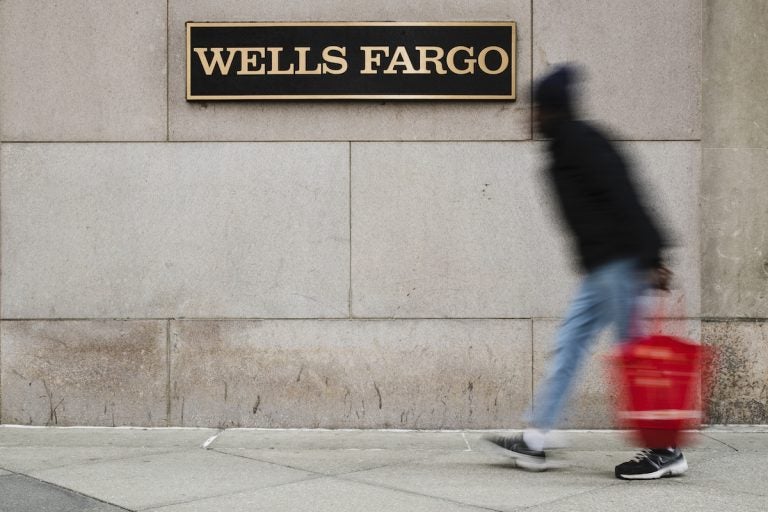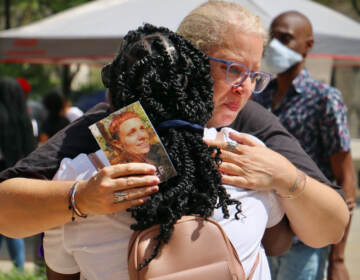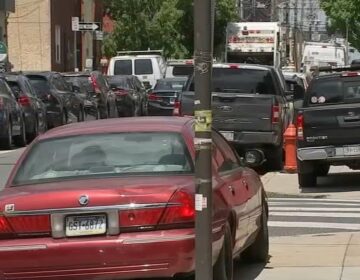Wells Fargo will pay Philadelphia $10M to settle city’s discriminatory lending lawsuit
Wells Fargo Bank and the City of Philadelphia have settled a 2017 lawsuit brought by the city over the bank’s alleged discriminatory lending practices.

This Nov. 29, 2018, photo shows a Wells Fargo bank location in Philadelphia. (Matt Rourke/AP Photo)
Wells Fargo Bank and the City of Philadelphia have settled a 2017 lawsuit brought by the city over the bank’s alleged discriminatory lending practices with a $10 million check.
The funds from Wells Fargo will mainly be spent on down payment and closing cost assistance for homebuyers up to 120% of the area median income, or $97,320 for a family of three. City solicitor Marcel Pratt touted the settlement in an announcement of the collaboration agreement.
“Our focus has been on directing relief to the neighborhoods that were the subject of the litigation, which were communities of color that continue to face challenges,” Pratt’s statement reads. “One of the advantages of this resolution is that we secured valuable benefits that would not have been available through pursuing our litigation.”
Philadelphia sued Wells Fargo for violating the Fair Housing Act, arguing that the bank targeted Black and Latinx neighborhoods with predatory loans in a process known as “reverse redlining,” where non-white borrowers are sold mortgages with exorbitant fees and interest rates. It was these same neighborhoods that had often been discriminated against in the 20th century, when they were denied access to capital for racist reasons.
The city’s lawsuit argued that almost a quarter of loans to these populations were high-risk, while fewer than 8% of loans to white customers were. The suit alleged the bank knew of these disparities and even encouraged employees to take advantage of them, which Wells Fargo adamantly denied.
The city sought restitution for lost property taxes and for the costs of increased residential segregation, which has well-documented negative ramifications for communities and individuals.
But Philadelphia’s ability to reap the full costs of the damages was handicapped by a 2017 Supreme Court decision.
The Bank of America v. Miami case affirmed cities’ ability to sue predatory lenders, but it also specified that municipalities needed to prove an undefined “direct relation” between the banks’ actions and the injuries alleged. That left a great deal of uncertainty around how successful aggressive local governments could be in their legal actions.
“Ten million dollars is a relatively small amount when compared to the harms caused by over a decade’s worth of reverse redlining,” said Samuel Bagenstos, Professor of Law at the University of Michigan, and a specialist in constitutional and civil rights litigation.
“But the Supreme Court’s recent decision in the City of Miami’s Fair Housing Act case involving similar allegations made it harder for a city to recover for those economic harms,” wrote Bagenstos in an email message, “a fact that necessarily hurt Philadelphia’s ability to negotiate a truly compensatory settlement.”
When the U.S. District Court for the Eastern District of Pennsylvania denied Wells Fargo’s motion to dismiss the case, Judge Anita Brody nonetheless said that she had “serious concerns about the viability of the economic injury aspect of the city’s claim.”
The Kenney administration says Brody’s ruling was not a factor in the settlement and rejects the idea that the settlement is in any way small, pointing out that the current budget for the city’s down payment and closing cost assistance is $12 million. The funds will allow an estimated 950 families to become homeowners, the city estimates.
“Both in the context of current funding and in the context of a City with limited resources generally, this $10 million settlement is anything but ‘small,’” said Paul Chrystie, a spokesperson for the administration.
Of that $10 million, $8.5 million will cover grants to assist with closing costs while $1 million will be spent to bolster the city’s foreclosure prevention program. Officials estimate the $1 million investment will prevent 250 foreclosures. The last $500,000 will go towards Philadelphia’s vacant land care program, which will allow 165 additional lots to be maintained and cleaned over the next three years.
“We’re pleased that we’ve been able to resolve this matter in a way that will provide real, tangible sustainable homeownership opportunities for many low- and moderate-income residents of Philadelphia,” said Joe Kirk, Wells Fargo’s Greater Philadelphia Region Bank President, in a press release.
The final part of the agreement between the two parties will be a program called “Understanding Philadelphia.” The program will educate bank employees who work on mortgage loans in the city, teaching them about the history of the urban housing market and what contemporary needs are.
City solicitor Pratt says that he hopes this effort will promote home purchasing across Philadelphia, which saw its rate of ownership plummet in the wake of the Great Recession — especially in the neighborhoods that were at the center of the suit.
 WHYY is one of over 20 news organizations producing Broke in Philly, a collaborative reporting project on solutions to poverty and the city’s push towards economic justice. Follow us at @BrokeInPhilly.
WHYY is one of over 20 news organizations producing Broke in Philly, a collaborative reporting project on solutions to poverty and the city’s push towards economic justice. Follow us at @BrokeInPhilly.
WHYY is your source for fact-based, in-depth journalism and information. As a nonprofit organization, we rely on financial support from readers like you. Please give today.







